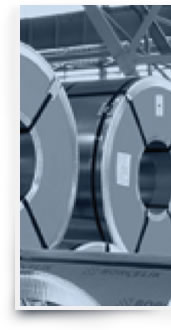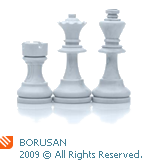Steel
A careful look at all the sectors in which Borusan is actively involved we will note that all the Group companies as a whole passed through two completely different cycles. Moreover, our priority was always to closely monitor sector dynamics as well as to focus on our customers.
The year 2008 was a unique one in the sense that companies active in the steel sector experienced substantial fluctuations with relation to market demand and price levels. When compared to the same time span the previous year we see that the domestic steel pipe market, which was especially affected by the positive developments in the construction and automotive sectors, grew by 7% during the first half of the year. As a result of strong market conditions and increasing raw material costs steel prices reached their highest point in history. As the detrimental effects of the global crisis began to be felt in all other sectors, however, the domestic demand for steel pipe fell substantially during the second half of the year. Furthermore, prices also began to plummet significantly in keeping with the rapid drop in demand. Canceled orders, contracting demands in the domestic and foreign markets, indefinite suspension of various investment projects, reduced financing opportunities and increasing costs were just some of the effects that were felt.
The Pipe Group
During 2008 the domestic demand for steel pipe fell by 10% as compared to the previous year and was limited to 1.8 million tons. The drop in demand was consistent across almost all product segments. The only domestic segment to remain unaffected was the large diameter line pipes. The market, which carries significant importance for water, petroleum, and natural gas distribution projects, has shown the potential for sustainable growth.
Despite the challenging market conditions in 2008, Borusan Mannesmann Pipe (BMB) managed to increase its turnover and sales volume by 36% and 3%, respectively. The share of revenue generated from the sale of high value added products including pressurized, special and spiral pipe, increased over 2007 figures, from 47% to 50%. By increasing the number of exclusive and limited distributors in its domestic distribution channel from 140 to 170 within a year BMB has reinforced its lead position in the Turkish steel pipe market, as evidenced by its 25% market share.
The fact that exports accounted for close to 50% of the sales revenue during 2008 shows that this was one of the primary reasons behind BMB's successful sales volume. The export potential of BMB has always been one its competitive advantages during times characterized by a contraction in local demand. In general, exports were directed towards more than 40 countries in the North American, North African, European and the Middle Eastern regions.

The delivery of spiral pipe to the Elba Express project, the largest one in history both in terms of value and tonnage was also successfully completed in 2008. With a contract value of $ 170 million and 100,000 tons in sales volume, the Elba Express project was a great step towards making an entry into the U.S. line pipe market and in terms of Borusan becoming a global steel pipe manufacturer. Through this groundbreaking venture BMB successfully provided for the needs of the new 312 km pipeline, which will significantly increase the natural gas being delivered to the eastern and southeastern regions of the United States. With the completion of the delivery for this project BMB has intensified efforts to secure new pipe supply agreements and strengthen its foothold in the North American market. The Company's annual production capacity of 900,000 tons is made up of 700,000 tons of longitudinally welded and 200,000 tons of spiral welded pipe. During 2008 BMB invested a total of $ 22 million for the annual maintenance investment programs and capacity expansion projects. The long-term strategic targets based on our 50 years of experience and market knowledge are still valid today.
The turnover of Vobarno, which was established in Italy, stood at 32 million euro due to an increase in sales to 22,000 tons during 2008. Since the European automotive sector decreased as a result of the crisis the Company's sales volume also shrank by 10 % as compared to 2007 figures. The Company's sales distribution, meanwhile, remained unchanged with regard to 2007 and approximately half of the sales were directed at the export markets of Germany, France and Spain.
In the meantime, the Group's 2008 cumulative sales for its stainless steel pipe manufacturer Borusan Stainless Pipe actually gained by 118%, topping $ 30 million.
The Flat Steel Group
During 2008 Turkey's cumulative raw steel production increased by 4.1% and reached 26.8 million tons. Flat steel products accounted for 4.2 million tons of the country's combined steel production. The problem of a surplus in long product manufacturing and a shortage in flat steel production, which have characterized the sector during the previous years, continues to exist today.
Flat steel consumption in Turkey during 2008 was reported to be 10 million tons. Cold drawn and galvanized product consumption stood at 2.2 and 1.4 million tons, respectively.
Even though the contraction affected both domestic and foreign markets and caused sales to remain below targets during 2008, Borçelik still managed to increase its sales turnover to $ 943 million, an 18% increase over the previous year. The local automotive sector, which accounts for a substantial portion of the steel consumption in the local market, lowered production by 38% during the second half of the year while the output of white goods manufacturers fell by 8% between the third and fourth quarters. Borçelik's export markets during 2008 were the European Union, the Middle East, North Africa and Russia. Borçelik's third cold rolling and third galvanizing line investments, which ultimately amounted to $ 138 million, were completed and began production during October of 2008. As a result, the combined cold rolling capacity was increased by 60%, from 1 million tons to 1.6 million tons, while the galvanizing capacity reached 900,000 tons. Borçelik has became Turkey's most modern and largest capacity manufacturer of galvanized flat steel and the new line has improved flexibility and efficiency in terms of optimizing customer orders by separating them according to segments, planning production based on the both the time and amount of coating, as well as the quality of the surface.
In 2008 Borçelik's market share in galvanized steel and cold-rolled steel stood at 19% and 16%, respectively. As a result of its successful and ongoing Total Productive Management (TPM) efforts, which began in 2005, Borçelik was awarded the JIPM Excellence Award during 2008 from the Japan Institute of Plant Maintenance (JIPM).





 Divisional Analysis
Divisional Analysis 